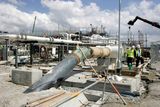Tullow Oil narrows losses to $1bn as revenue slides 27pc in 2015
Tullow Oil chief Aidan Heavey. Photo: Mark Condren
Tullow Oil, the Irish oil and gas explorer, has posted a full year loss of $1bn (€886m) for 2015 as revenues in the firm plummeted by 27pc off the back of falling oil prices.
Revenue in the firm, which has operations across Africa, dropped to $1.6bn, down significantly from the $2.21bn the firm recorded in revenue in 2014.
However, the firm has narrowed its losses year on year by 37pc, bringing its loss after tax down to $1.037bn, a significant deviation from the $1.64bn loss it filed in 2014.
Tullow chief executive, Aidan Heavey, said that the firm has responded well to the falling oil prices as it secured current and future cash flow.
"Our challenge in 2016 is to be equally robust in responding to the uncertainties that remain in the sector. In the year ahead, we have three key priorities: ensuring continued low cost production from West Africa - including the start-up of production from TEN between July and August 2016; driving further reductions in operating costs and capital expenditure; and focusing on deleveraging the balance sheet through free cash flow generation and strategic portfolio management," Mr Heavey said.
Net debt at the end of the year in the firm stood at $4bn with significant facility headroom and free cash of $1.9bn.
Mark to market value of Tullow's oil hedges at the end of January was $668m with 52pc of 2016 entitlement oil production at average floor price of around $75/bbl.
"As we look ahead, we have a portfolio of world class, low cost oil assets which will produce around 100,000 bopd in 2017 and a major position in one of the world’s newest, low cost, oil provinces in East Africa, both enabling us to create substantial value," Mr Heavey said.
In the group's financial results Tullow said that it had delivered 'solid' revenue and pre-tax operating cash flow. Tullow also said that it reported a post-tax loss following write-downs that were exacerbated by lower oil prices.
Join the Irish Independent WhatsApp channel
Stay up to date with all the latest news














